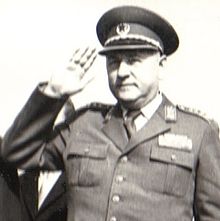Ivan Gošnjak
Ivan Gošnjak ( Serbian - Cyrillic Иван Гошњак ; born June 10, 1909 in Ogulin , Austria-Hungary , today: Croatia ; † February 8, 1980 in Belgrade ) was an officer of the People's Liberation Army , general of the Yugoslav People's Army and a politician of the Union of Communists of Yugoslavia (BdKJ) from the Socialist Federal Republic of Yugoslavia (SFRY), who was Minister of Defense (Federal Secretary for National Defense) between 1953 and 1967.
Life
Ivan Gošnjak was a carpenter by profession and joined the Communist Party of Yugoslavia (KPJ) as a member in 1934 . In 1935 he was sent to Moscow , where he attended the International Lenin School and met Josip Broz Tito , whom he served as an advisor for more than 40 years. In 1936 he completed military training in the Ryazan military camp and from January 1937 took part in the Spanish Civil War as a volunteer with the battle name number 36 . There he was promoted as a supporter of Josef Stalin to captain of the international brigades . After the defeat of the Republican forces , he was arrested in France in February 1939 before he managed to escape after France surrendered at the Armistice of Compiègne on June 22, 1940 . He fled to the German Reich in 1941 and worked there as a worker with a forged passport.
In July 1942 Gošnjak returned to his Croatian homeland and was deputy commander of the local partisan command and commanding general of the 1st Croatian Corps during the partisan war between 1942 and 1943. After he was briefly commanding general of the IV Croatian Corps in 1943, he served as the commander of the Croatian Partisan Command between 1943 and 1945. On May 8 and 9, 1944, he took part alongside Andrija Hebrang as a representative of the Communist Party of Yugoslavia at the third meeting of the National Anti-Fascist Council for the Liberation of Croatia in Topusko .
After the end of the war, Ivan Gošnjak became Deputy Commander-in-Chief of the Yugoslav People's Army in the Federal People's Republic of Yugoslavia (FVRJ) in 1946 and held this post until 1950. At the same time, between 1946 and 1949 he was head of the People's Army personnel department. At the 5th party congress (July 21-28, 1948) of the Union of Communists of Yugoslavia (BdKJ), which emerged from the Communist Party of Yugoslavia , he became a member of the Central Committee's Politburo. He was from 1950 to 1953 Deputy Minister of Defense and was on the VI. Party Congress (November 2 to 7, 1952) Member of the Executive Committee of the Central Committee of the BdKJ, the successor body to the Politburo, and was a member of this executive committee until the plenary session of the Central Committee (October 4, 1966). As the successor to Josip Broz Tito, he became Minister of Defense (Federal Secretary for National Defense) in his fourth cabinet on January 14, 1953 and also held this position for fourteen years in the Tito V , Tito VI and Stambolić cabinets until May 18, 1967 whereupon Nikola Ljubičić succeeded him in the Špiljak cabinet on May 18, 1967 . At the same time he acted from 1958 to 1964 as chairman of the Central Committee of the Yugoslav People's Army. At the plenum of the Central Committee (October 4, 1966) he finally became a member of the Presidium of the Central Committee of the BdKJ.
For his many years of service he was awarded the Order of Freedom and the Order of the People's Hero . He was also awarded the Soviet Suvorov Order and the Czechoslovak Order of the White Lion .
Web links
- Entry in generals.dk
- Short biography (archive version)
- List of the members of the Politburo of the BdKJ
- Governments of the Socialist Federative Republic of Yugoslavia 1945–1992
| personal data | |
|---|---|
| SURNAME | Gošnjak, Ivan |
| BRIEF DESCRIPTION | Yugoslav politician and general |
| DATE OF BIRTH | June 10, 1909 |
| PLACE OF BIRTH | Ogulin , Austria-Hungary , today: Croatia |
| DATE OF DEATH | February 8, 1980 |
| Place of death | Belgrade |

